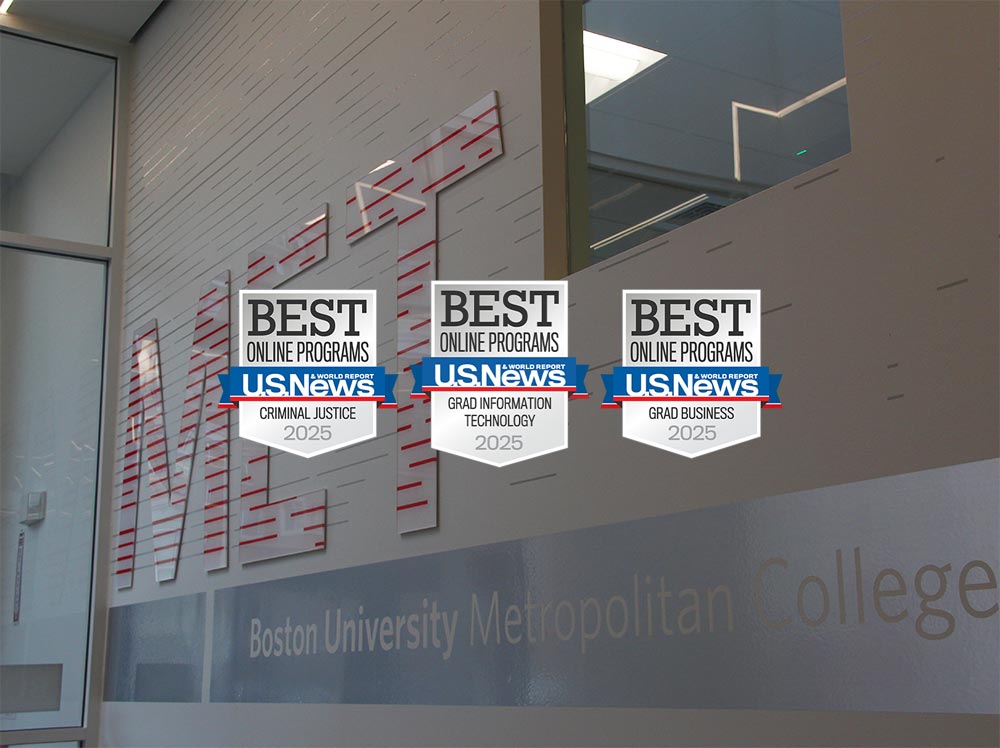Program at a Glance
- Online, On Campus, and Blended
- Part-Time Study
- 16 Credits
- 8–12 Months to Completion
- 17 Core Faculty
- No GRE/GMAT
- Tuition & Fees Range—Part-Time Study*: $14,478–$16,178
*Based on 2025–2026 Boston University tuition and fees.
Learn Cybersecurity Skills to Guard Valuable Digital Information
Available on campus, online, and in a blended format, the Graduate Certificate in Information Security at Boston University’s Metropolitan College (MET) provides the skills to develop and implement a strong IT security program within the organization. According to a recent report from Cybersecurity Ventures, it is predicted that there will be 3.5 million cybersecurity jobs in 2021, and not enough talent to fill them. MIT Technology Review asserts that fewer than one in four candidates for such jobs are qualified for the work.
BU MET’s graduate certificate program in Information Security can provide the specific skills you need to protect organizational information from cyber attacks that include unauthorized access, disclosure, or destruction—and help avoid loss of business, lawsuits, and even bankruptcy.
From government agencies and hospitals to insurance companies and private businesses, organizations rely upon technology systems and smart devices to operate. With that much digital presence, the risk of a cybersecurity breach is significant—and the amount of critical or confidential information that is vulnerable to hackers, thieves, and other malicious players continues to increase. BU MET’s Information Security certificate introduces various aspects of cybersecurity, including IT security policies and system security. You will learn about digital forensics to help in investigating a security breach, and obtain a good understanding of how information is stored in a database and what services are available to protect it. We will also cover standards and laws, such as HIPPA, PCI, and GLBA, which help protect confidentiality and privacy of customer data.

#4, America’s Top Online Colleges
Newsweek magazine ranked Boston University’s online programs #4 in the nation in its 2023 survey.
Learn More
#10, Best Online Master's in Computer Information Technology Programs
MET’s online master’s degrees in computer information technology are ranked #10 in the nation by U.S. News & World Report for 2025.
Learn More
Request Information
Receive more details about your program of interest.
Learn More
Computer Science Career Outlook
Top computer science careers in data science, software development, and other popular areas of IT.
Learn more

“BU MET made me feel at home while setting me up for my dream career.” Read more.
Ian Hill (MET'19)
Sr. Information Security Engineer, The Baupost Group
MS, Computer Information Systems; Concentration, Security; Graduate Certificate, Information Security
Connect with a Student Ambassador
Why BU Should Be Your Top Choice for Computer Science Graduate Study
- Recognized & Certified: Boston University is recognized by the National Security Agency and the Department of Homeland Security as a Center of Academic Excellence (CAE) in Cyber Defense and Research. BU MET’s information security programs are certified by the Committee on National Security Systems (CNSS).
- Active Learning Environment: BU MET’s computer science courses ensure you get the attention you need, while introducing case studies and real-world projects that emphasize technical and theoretical knowledge—combining in-depth, practical experience with the critical skills needed to remain on the forefront of the information technology field. In addition, BU’s Center for Reliable Information Systems and Cyber Security (RISCS) offers opportunities to collaborate and participate in research on system reliability and information security.
- Engaged Faculty: In BU MET’s computer science graduate programs, you benefit from working closely with highly qualified faculty and seasoned industry leaders in a wide range of technology fields who are committed to teaching the latest technologies within the framework of ideas, concepts, and methods that drive innovation.
- Extensive Network: Study alongside peers and professionals with solid IT experience, learn from faculty who have valuable contacts across several sectors, and benefit from an alumni community with strong professional connections.
- 15:1 Class Ratio: Enjoy an exceptional student-to-instructor ratio, ensuring close interaction with faculty and access to support.
- Valuable Resources: Make use of Boston University’s extensive resources, including the Center for Career Development, Educational Resource Center, Fitness & Recreation Center, IT Help Centers, Mugar Memorial Library, Center for Antiracist Research, Howard Thurman Center for Common Ground, George Sherman Union, Rafik B. Hariri Institute for Computing and Computational Science & Engineering, and many others.
- Flexible Options: Study at the pace that works for you, evenings on campus, fully online, or in the blended format that combines on-campus and online learning. Courses begin fall, spring, and summer; online courses have two starts per term.
- Track Record: Learn from the best—BU MET’s Department of Computer Science was established in 1979 and is the longest-running computer science department at BU. Over its four decades, the department has played an important role in the emergence of IT at the University and throughout the region.
Prepare for the Future of Technology with BU MET
The four-course Information Security graduate certificate is part of BU MET’s portfolio of computer science and IT graduate programs. For over forty years, the Department of Computer Science at Metropolitan College has prepared students to tackle contemporary challenges in the field. Our programs are uniquely flexible—we offer courses evenings on campus, fully online, or in a blended format that combines online study with occasional campus visits—so you can balance graduate school with your career, family, and other obligations. We take pride in providing training in critical specialization areas and emphasizing practical, insightful, and adaptable knowledge that can be immediately applied on the job while informing your career growth for years to come. We also offer extensive advising to help you identify the subjects you’ll need to achieve your career goals.
Our degree programs are certified by the Committee on National Security Systems (CNSS)—the MS in Computer Information Systems has additional accreditation from the Project Management Institute Global Accreditation Center for Project Management Education Programs (GAC) and the Commission on Accreditation for Health Informatics and Information Management Education (CAHIIM). Boston University is designated a Center of Academic Excellence (CAE) in Cyber Defense and Research by the National Security Agency and Department of Homeland Security.
Gain Expertise in Information Security
Metropolitan College’s Graduate Certificate in Information Security will equip you with:
- Advanced knowledge of information security concepts, governance, biometric systems, and database systems security, as well as network security and cryptography.
- Proficiency in risk management, such as asset assessments, architectural solutions, modeling, and design.
- Competence in security policies, processes, technology, and operations.
Certificate-to-Degree Pathway
You can earn the master’s in Computer Information Systems with a concentration in Security by completing the Graduate Certificate in Information Security and the Graduate Certificate in Information Technology, plus two additional courses: Introduction to Probability and Statistics (MET CS 546) and either Information Structures with Java (MET CS 520) or Information Structures with Python (MET CS 521). Students currently enrolled in a graduate certificate who are interested in transitioning into a master’s degree should contact their academic advisor to declare their interest in this pathway. A new master’s degree application is not required. Connect with a graduate admissions advisor at csadmissions@bu.edu to learn more about this option.
Information Security Graduate Certificate Curriculum—On Campus
(Four courses/16 credits)
Choose any four of the following:
MET CS 599 Biometrics
Sprg ‘25
In this course we will study the fundamental and design applications of various biometric systems based on fingerprints, voice, face, hand geometry, palm print, iris, retina, and other modalities. Multimodal biometric systems that use two or more of the above characteristics will be discussed. Biometric system performance and issues related to the security and privacy aspects of these systems will also be addressed. [ 4 cr. ]
| Section |
Type |
Instructor |
Location |
Days |
Times |
| A1 |
IND |
Djordjevic |
PHO 201 |
W |
6:00 pm – 8:45 pm |
MET CS 674 Database Security
Sprg ‘25
Graduate Prerequisites: CS 579 or CS 669 or consent of the instructor - The course provides a strong foundation in database security and auditing. This course utilizes Oracle scenarios and step-by-step examples. The following topics are covered: security, profiles, password policies, privileges and roles, Virtual Private Databases, and auditing. The course also covers advanced topics such as SQL injection, database management security issues such as securing the DBMS, enforcing access controls, and related issues. Prereq: MET CS 579 or MET CS 669; or instructor's consent. [ 4 cr. ]
| Section |
Type |
Instructor |
Location |
Days |
Times |
| O2 |
IND |
Carroll |
|
ARR |
12:00 am – 12:00 am |
MET CS 684 Enterprise Cybersecurity Management
Sprg ‘25
This course covers important topics that students need to understand in order to effectively manage a successful cybersecurity and privacy program, including governance, risk management, asset classification and incidence response. Students are first introduced to cybersecurity & privacy policy frameworks, governance, standards, and strategy. Risk tolerance is critical when building a cybersecurity and privacy program that supports business goals and strategies. Risk management fundamentals and assessment processes will be reviewed in depth including the methodology for identifying, quantifying, mitigating and controlling risks. Asset classification and the importance of protecting Intellectual Property (IP) will prepare students to understand and identify protection mechanisms needed to defend against malicious actors, including industry competitors and nation states. Incident Response programs will cover preparation and responses necessary to triage incidents and respond quickly to limit damage from malicious actors. [ 4 cr. ]
| Section |
Type |
Instructor |
Location |
Days |
Times |
| A1 |
IND |
Mukavetz |
CAS 426 |
M |
6:00 pm – 8:45 pm |
| E1 |
IND |
Mukavetz |
CAS 426 |
M |
6:00 pm – 8:45 pm |
MET CS 690 Network Security
Sprg ‘25
Undergraduate Prerequisites: (METCS535 OR METCS625) or instructor's consent. - This course will cover advanced network security issues and solutions. The main focus on the first part of the course will be on Security basics, i.e. security services, access controls, vulnerabilities, threats and risk, network architectures and attacks. In the second part of the course, particular focus and emphasis will be given to network security capabilities and mechanisms (Access Control on wire-line and wireless networks), IPsec, Firewalls, Deep Packet Inspection and Transport security. The final portion of the course will address Network Application security (Email, Ad-hoc, XML/SAML and Services Oriented Architecture security. As part of our course review we will explore a number of Network Use Cases. Prereq: MET CS 535 or MET CS 625; Familiarity with OSI and TCP/IP protocol stack; Background-familiarity with binary numbers, prime numbers, binary- hexadecimal-decimal conversions, etc; Familiarity with computer programming concepts; or instructor's consent. [ 4 cr. ]
| Section |
Type |
Instructor |
Location |
Days |
Times |
| A1 |
IND |
Zhang |
WED 140 |
R |
6:00 pm – 8:45 pm |
| O1 |
IND |
Zhang |
|
ARR |
12:00 am – 12:00 am |
MET CS 693 Digital Forensics and Investigations
Sprg ‘25
Provides a comprehensive understanding of digital forensics and investigation tools and techniques. Learn what computer forensics and investigation is as a profession and gain an understanding of the overall investigative process. Operating system architectures and disk structures are discussed. Studies how to set up an investigator's office and laboratory, as well as what computer forensic hardware and software tools are available. Other topics covered include importance of digital evidence controls and how to process crime and incident scenes, details of data acquisition, computer forensic analysis, e-mail investigations, image file recovery, investigative report writing, and expert witness requirements. Provides a range of laboratory and hands-on assignments either in solo or in teams. With rapid growth of computer systems and digital data this area has grown in importance. Prereq: Working knowledge of windows computers, including installing and removing software. Access to a PC meeting the minimum system requirements defined in the course syllabus. [ 4 cr. ]
| Section |
Type |
Instructor |
Location |
Days |
Times |
| E1 |
IND |
Arena |
MET 101 |
S |
9:00 am – 12:00 pm |
| O2 |
IND |
Navarro |
|
ARR |
12:00 am – 12:00 am |
MET CS 694 Mobile Forensics and Security
Sprg ‘25
Overview of mobile forensics investigation techniques and tools. Topics include mobile forensics procedures and principles, related legal issues, mobile platform internals, bypassing passcode, rooting or jailbreaking process, logical and physical acquisition, data recovery and analysis, and reporting. Provides in-depth coverage of both iOS and Android platforms. Laboratory and hands-on exercises using current tools are provided and required. [ 4 cr. ]
| Section |
Type |
Instructor |
Location |
Days |
Times |
| A1 |
IND |
Zhang |
MCS B33 |
R |
6:00 pm – 8:45 pm |
MET CS 695 Cybersecurity
Sprg ‘25
Undergraduate Prerequisites: (METCS625) or instructor's consent - This course introduces fundamental concepts, principles of cybersecurity and their use in the development of security mechanisms and policies. Topics include basic risk assessment and management; basic legal and ethics issues, various cyber attacks, defense methods and tools; security principles, models and components; different crypto protocols, techniques and tools, including symmetric and asymmetric encryption algorithms, hashing, public key infrastructure, and how they can be used; security threats and defense to hardware, operating systems, networks and applications in modern computing environments. Hands-on labs using current tools are provided and required. Prerequisite: METCS535 or METCS625 or instructor's consent. [ 4 cr. ]
| Section |
Type |
Instructor |
Location |
Days |
Times |
| A1 |
IND |
Arena |
MCS B29 |
M |
6:00 pm – 8:45 pm |
| O1 |
IND |
See |
|
ARR |
12:00 am – 12:00 am |
MET CS 763 Secure Software Development
Sprg ‘25
Graduate Prerequisites: MET TC 250 or MET CS 248 or MET OM 501. - Overview of techniques and tools to develop secure software. Focus on the application security. Topics include secure software development processes, threat modeling, secure requirements and architectures, vulnerability and malware analysis using static code analysis and dynamic analysis tools, vulnerabilities in C/C and Java programs, Crypto and secure APIs, vulnerabilities in web applications and mobile applications, and security testing. Hands-on lab and programming exercises using current tools are provided and required. Prerequisite: At least two 500- level (or above) programming-intensive computer science courses; or instructor's consent. [ 4 cr. ]
| Section |
Type |
Instructor |
Location |
Days |
Times |
| A1 |
IND |
Zhang |
FLR 123 |
T |
6:00 pm – 8:45 pm |
MET CS 789 Cryptography
Graduate Prerequisites: (METCS248 & METCS566) or consent of the instructor - The course covers the main concepts and principles of cryptography with the main emphasis put on public key cryptography. It begins with the review of integers and a thorough coverage of the fundamentals of finite group theory followed by the RSA and ElGamal ciphers. Primitive roots in cyclic groups and the discrete log problem are discussed. Baby-step Giant-step and the Index Calculus probabilistic algorithms to compute discrete logs in cyclic groups are presented. Naor -- Reingold and Blum -- Blum -- Shub Random Number Generators as well as Fermat, Euler and Miller-Rabin primality tests are thoroughly covered. Pollard's Rho, Pollard's and Quadratic Sieve factorization algorithms are presented. The course ends with the coverage of some oblivious transfer protocols and zero-knowledge proofs. There are numerous programming assignments in the course. Prereq: MET CS 248, or instructor's consent. [ 4 cr. ]
MET CS 799 Advanced Cryptography
Undergraduate Prerequisites: (METCS789) or instructor's consent - This course builds on the material covered in CS 789 Cryptography. It begins with the coverage of commutative rings, finite fields, rings of polynomials, and finding of the greatest common divisor in the ring of polynomials. Irreducible polynomials are discussed. Field extensions and fields Fᴩ [x]/P are thoroughly covered. The main emphasis is put on elliptic curves over Fᴩ and F₂ and the ElGamal cipher on elliptic curves is presented. Block ciphers DES and double and triple DES are introduced. AES and WHIRLPOOL block ciphers and modes of operation are covered. The course continues with the introduction of message integrity and message authentication. In the last part of the course cryptographic hash functions SHA-512 and WHIRLPOOL as well as various digital signatures are introduced. Finally, entity authentication and key management issues are discussed. Prereq: MET CS 789; or instructor's consent. [ 4 cr. ]
Information Security Graduate Certificate Curriculum—Blended & Online
(Four courses/16 credits)
Choose any four of the following:
MET CS 674 Database Security
Sprg ‘25
Graduate Prerequisites: CS 579 or CS 669 or consent of the instructor - The course provides a strong foundation in database security and auditing. This course utilizes Oracle scenarios and step-by-step examples. The following topics are covered: security, profiles, password policies, privileges and roles, Virtual Private Databases, and auditing. The course also covers advanced topics such as SQL injection, database management security issues such as securing the DBMS, enforcing access controls, and related issues. Prereq: MET CS 579 or MET CS 669; or instructor's consent. [ 4 cr. ]
| Section |
Type |
Instructor |
Location |
Days |
Times |
| O2 |
IND |
Carroll |
|
ARR |
12:00 am – 12:00 am |
MET CS 684 Enterprise Cybersecurity Management
Sprg ‘25
This course covers important topics that students need to understand in order to effectively manage a successful cybersecurity and privacy program, including governance, risk management, asset classification and incidence response. Students are first introduced to cybersecurity & privacy policy frameworks, governance, standards, and strategy. Risk tolerance is critical when building a cybersecurity and privacy program that supports business goals and strategies. Risk management fundamentals and assessment processes will be reviewed in depth including the methodology for identifying, quantifying, mitigating and controlling risks. Asset classification and the importance of protecting Intellectual Property (IP) will prepare students to understand and identify protection mechanisms needed to defend against malicious actors, including industry competitors and nation states. Incident Response programs will cover preparation and responses necessary to triage incidents and respond quickly to limit damage from malicious actors. [ 4 cr. ]
| Section |
Type |
Instructor |
Location |
Days |
Times |
| A1 |
IND |
Mukavetz |
CAS 426 |
M |
6:00 pm – 8:45 pm |
| E1 |
IND |
Mukavetz |
CAS 426 |
M |
6:00 pm – 8:45 pm |
MET CS 690 Network Security
Sprg ‘25
Undergraduate Prerequisites: (METCS535 OR METCS625) or instructor's consent. - This course will cover advanced network security issues and solutions. The main focus on the first part of the course will be on Security basics, i.e. security services, access controls, vulnerabilities, threats and risk, network architectures and attacks. In the second part of the course, particular focus and emphasis will be given to network security capabilities and mechanisms (Access Control on wire-line and wireless networks), IPsec, Firewalls, Deep Packet Inspection and Transport security. The final portion of the course will address Network Application security (Email, Ad-hoc, XML/SAML and Services Oriented Architecture security. As part of our course review we will explore a number of Network Use Cases. Prereq: MET CS 535 or MET CS 625; Familiarity with OSI and TCP/IP protocol stack; Background-familiarity with binary numbers, prime numbers, binary- hexadecimal-decimal conversions, etc; Familiarity with computer programming concepts; or instructor's consent. [ 4 cr. ]
| Section |
Type |
Instructor |
Location |
Days |
Times |
| A1 |
IND |
Zhang |
WED 140 |
R |
6:00 pm – 8:45 pm |
| O1 |
IND |
Zhang |
|
ARR |
12:00 am – 12:00 am |
MET CS 693 Digital Forensics and Investigations
Sprg ‘25
Provides a comprehensive understanding of digital forensics and investigation tools and techniques. Learn what computer forensics and investigation is as a profession and gain an understanding of the overall investigative process. Operating system architectures and disk structures are discussed. Studies how to set up an investigator's office and laboratory, as well as what computer forensic hardware and software tools are available. Other topics covered include importance of digital evidence controls and how to process crime and incident scenes, details of data acquisition, computer forensic analysis, e-mail investigations, image file recovery, investigative report writing, and expert witness requirements. Provides a range of laboratory and hands-on assignments either in solo or in teams. With rapid growth of computer systems and digital data this area has grown in importance. Prereq: Working knowledge of windows computers, including installing and removing software. Access to a PC meeting the minimum system requirements defined in the course syllabus. [ 4 cr. ]
| Section |
Type |
Instructor |
Location |
Days |
Times |
| E1 |
IND |
Arena |
MET 101 |
S |
9:00 am – 12:00 pm |
| O2 |
IND |
Navarro |
|
ARR |
12:00 am – 12:00 am |
MET CS 694 Mobile Forensics and Security
Sprg ‘25
Overview of mobile forensics investigation techniques and tools. Topics include mobile forensics procedures and principles, related legal issues, mobile platform internals, bypassing passcode, rooting or jailbreaking process, logical and physical acquisition, data recovery and analysis, and reporting. Provides in-depth coverage of both iOS and Android platforms. Laboratory and hands-on exercises using current tools are provided and required. [ 4 cr. ]
| Section |
Type |
Instructor |
Location |
Days |
Times |
| A1 |
IND |
Zhang |
MCS B33 |
R |
6:00 pm – 8:45 pm |
MET CS 695 Cybersecurity
Sprg ‘25
Undergraduate Prerequisites: (METCS625) or instructor's consent - This course introduces fundamental concepts, principles of cybersecurity and their use in the development of security mechanisms and policies. Topics include basic risk assessment and management; basic legal and ethics issues, various cyber attacks, defense methods and tools; security principles, models and components; different crypto protocols, techniques and tools, including symmetric and asymmetric encryption algorithms, hashing, public key infrastructure, and how they can be used; security threats and defense to hardware, operating systems, networks and applications in modern computing environments. Hands-on labs using current tools are provided and required. Prerequisite: METCS535 or METCS625 or instructor's consent. [ 4 cr. ]
| Section |
Type |
Instructor |
Location |
Days |
Times |
| A1 |
IND |
Arena |
MCS B29 |
M |
6:00 pm – 8:45 pm |
| O1 |
IND |
See |
|
ARR |
12:00 am – 12:00 am |
Computer Science Faculty
Tuition & Financial Assistance
Competitive Tuition
Our part-time rates are substantially lower than those of the traditional, full-time residential programs yet provide access to the same high-quality BU education.
Learn More
Comprehensive Financial Assistance
Our services include
scholarships, graduate loans, and payment plans.
Learn More
How Much Does This Program Cost?
BU MET programs offer the flexibility of part-time study, either on campus or online. Tuition, fees, and total program cost are determined by enrollment status. Course enrollment in this certificate program is 1–2 courses (4–8 credits) in a semester, and tuition is charged the part-time per-credit rate.
Information Security Graduate Certificate (Online and On Campus)
| Enrollment Status |
Part Time |
| Courses per Semester |
2 courses
(8 credits) |
| Time to Degree |
2 semesters
(8 months) |
| Tuition* |
$567-$1,005
per credit** |
| Fees per Semester* |
$60 |
| Total Degree Cost* |
$14,478–
$16,178 |
*Based on 2024-2025 Boston University tuition & fee rates.
**Cost per credit is determined by course number (100–599 = $550/credit, 600–999 = $975/credit).
Questions? Please contact us to hear from an Admissions Advisor who can help you determine the best enrollment pathway. For information regarding financial aid, visit BU MET’s Financial Aid page.
Get Started
Please visit the BU MET admissions page for details on how to apply, financial assistance, tuition and fees, requirements for international students, and more.
Apply Now
What to Read Next: MET Computer Science & IT Knowledge Center
News & Events
Events
May 6th, 2025
at:
9:00am - 9:45am
Admitted Student Webinar: On-Campus Students Meet Your BU Classmates!
Details
Events
May 6th, 2025
at:
1:00pm - 1:45pm
Admitted Student Webinar: On-Campus Students Meet Your BU Classmates!
Details
Events
May 8th, 2025
at:
1:00pm - 1:45pm
Admitted Student Webinar: Online Students Meet Your BU Classmates!
Details
Back to Programs

























